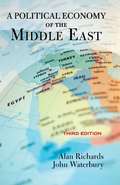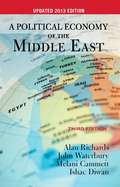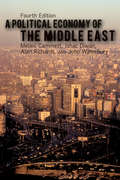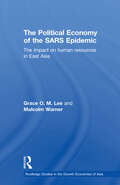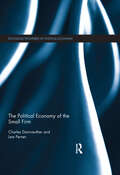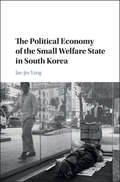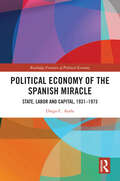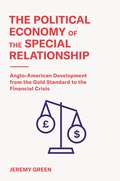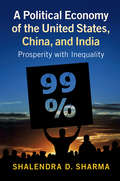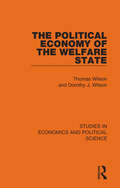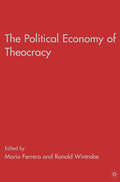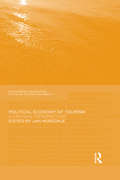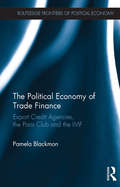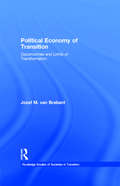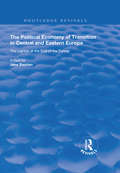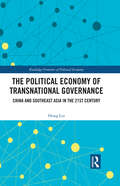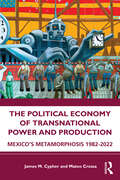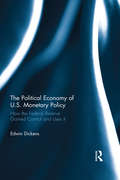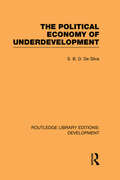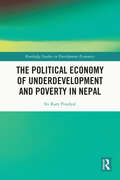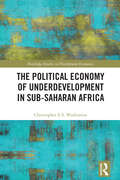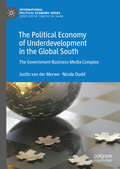- Table View
- List View
A Political Economy of the Middle East
by Alan Richards John WaterburyThis integrated, analytic text presents a comprehensive analysis of the transformation of the political economy of development in the contemporary Middle East over the past several decades. Extensively rewritten and revised, the third edition of A Political Economy of the Middle East retains a focus on the interaction of economic development processes, state systems, and social actors even as it also: Documents the many changes in demography, education, labor markets, urbanization, water and agriculture, and international labor migration in the Middle East in recent years; Considers the effect of rising oil prices on reinforcement of authoritarian governance in the region; Refines its assessment of "the Washington Consensus” to provide a more nuanced approach to the issue of the shifting balance of state and market in economic growth and reform (in an entirely rewritten Chapter 9); Presents Islamism as a vital force in the region that is nonetheless a vast, diverse social movement with many conflicting participants (in a wholly revised Chapter 14).
A Political Economy of the Middle East
by Alan Richards John Waterbury Melani Cammett Ishac DiwanA landmark analysis of the ongoing socioeconomic transformations of the Middle East, now with an epilogue on the ArabaSpring. "
Political Economy of the Middle East
by John Waterbury Alan Richards Ishac Diwan Melani CammettA Political Economy of the Middle East is the most comprehensive analysis of the political economy of development in the contemporary Middle East over the past several decades, examining the interaction of economic development processes, state systems, state policies, and social actors in the Middle East. The fourth edition, with new authors Melani Cammett and Ishac Diwan, has been thoroughly revised, with two new introductory chapters that provide an updated framework with which to understand and study the many changes in demography, education, labor markets, urbanization, water and agriculture, and international labor migration in the recent years. The new edition also includes: a new chapter that charts the political economy of the Gulf states and in particular the phenomenal growth of oil economies; a new chapter on the growth of the private sector and its effects in the region; a new chapter on the rise of "crony capitalism;" and increased coverage of the changes in civil society and social movements in the region including an exploration of the causes, dynamics, consequences, and aftermath of the Arab uprisings.
The Political Economy of the SARS Epidemic: The Impact on Human Resources in East Asia (Routledge Studies in the Growth Economies of Asia)
by Grace Lee Malcolm WarnerThis book discusses the political economy of the SARS epidemic and its impact on human resources in East Asia, as it occurred in 2003. The epidemic spread from the People’s Republic of China, to Hong Kong, Singapore and Taiwan, amongst other countries in East Asia and as far away as North America, particularly Canada, the EU and elsewhere. The book looks first at earlier precedents, such as the Black Death and the way in which the potential threats of the recent epidemic were diffused across the world in ‘instant news’ reports; examining why it was dubbed the first ‘global epidemic’ due to its media coverage and how far the threat started a psychological ‘tsunami’ of fear and panic. Next, it examines the anticipated economic consequences arising from this phenomenon and how it affected the business of everyday life, market behaviour and human resources in the Chinese and Overseas Chinese economies. It focuses in particular detail on the cases of the PRC, Hong Kong, Singapore and Taiwan. It concludes with a discussion of the issues involved and lessons to be learnt, and draws conclusions both for theory and practice vis-à-vis future pandemics that may threaten the global economy in the coming decade and the public policy issues involved
The Political Economy of the Small Firm (Routledge Frontiers of Political Economy #28)
by Charles Dannreuther Lew PerrenFor many, small firms are everyday realities of the economy and visible in every high-street and industrial estate. Their existence and importance is unquestionable. Such beliefs are understandable, but the authors of this new book would suggest they are misguided. The Political Economy of the Small Firm challenges the assumptions regarding small firms that pervade society and political representation. Small firms are not organised into a homogenous sector that has a clear constituency or political influence. In fact, the small firm is shown to be an inconstant political construct that is discursively ethereal and vulnerable to political exploitation. Fusing theories from political science, management and linguistics, Dannreuther and Perren assert that the idea of the small firm is an important discursive resource used by political actors to legitimise their actions, influence their citizens and help sustain regimes of accumulation. On top of this, the authors also empirically test their claims against 200 years of UK parliamentary debate, from the Industrial Revolution to the Blair government. The political construction of the small firm is shown not only to provide rhetorical mechanisms to maintain periods of capitalist accumulation, but also to increase the relative autonomy of the state and to centralise power to elite politicians. For a period of 150 years up to the 1970s, the small firm was an unexplored presence, below the political radar and resonant with poor working standards and extreme forms of competition. During the so-called Fordist period from the 1930s, the small firm was seen as the dirty, out-dated, contrast to the clean, modern future represented by mass production and corporations. The perceived failure of Fordism led to the invention of the small firm and its presentation as an ideal political construct. By fabricating assertions of what small firms are and what they want, frequently out of conjecture, the authors of this book show how political elites have been able to advocate radical reformist agendas since the 1970s in the name of a phantom constituency.
The Political Economy of the Small Welfare State in South Korea
by Yang Jae-JinThis book explains why the Korean welfare state is underdeveloped despite successful industrialization, democratization, a militant labor movement, and a centralized meritocracy. Unlike most social science books on Korea, which tend to focus on its developmental state and past years' rapid economic development, this book deals with social welfare issues and politics during the critical junctures in Korea's history: industrialization in the 1960-70s, the democratization and labor movement in the mid-1980s, globalization and the financial crisis in the 1990s and the 'wind of free welfare' in the 2010s. It highlights the self-interested activities of Korea's militant enterprise unionism at variance with those of a more solidaristic industrial unionism in the European welfare states. Korean big business, the chaebol, accommodated the unions' call for higher wages and more corporate welfare, which removed practical incentives for unions to demand social welfare. Korea's single-member-district electoral rules also induce politicians to sell geographically targeted, narrow benefits rather than public welfare for all.
Political Economy of the Spanish Miracle: State, Labor and Capital, 1931-1973 (Routledge Frontiers of Political Economy)
by Diego AyalaIn the 1950s and 1960s, Spain underwent one of the most rapid processes of economic development the world had ever seen. Most existing analyses of this process explain the “Spanish Miracle” as a product of the unleashing of market forces and of changes in economic policy made by the Franco regime in the 1950s. Political Economy of the Spanish Miracle provides an alternative explanation of Spanish economic development, analyzing the Miracle from an interdisciplinary political economy perspective that treats capitalist growth as a complex and dynamic interaction between capitalists, workers and the state. The Spanish Miracle is linked to changes in Spanish society produced by the Spanish Civil War, to the class structure of the regime brought to power by that Civil War and to the interaction between domestic social struggles under the Franco regime and Spain’s insertion into the international political economy of the Cold War capitalist world. Ambitious in scope, Political Economy of the Spanish Miracle both revises conventional understandings of Spanish economic growth and situates Spain within comparative discussions of development in the twentieth century. This book will be of great interest to readers in political economy, economic sociology, historical sociology and Spanish and European history more broadly.
The Political Economy of the Special Relationship: Anglo-American Development from the Gold Standard to the Financial Crisis
by Jeremy GreenHow America's global financial power was created and shaped through its special relationship with BritainThe rise of global finance in the latter half of the twentieth century has long been understood as one chapter in a larger story about the postwar growth of the United States. The Political Economy of the Special Relationship challenges this popular narrative. Revealing the Anglo-American origins of financial globalization, Jeremy Green sheds new light on Britain’s hugely significant, but often overlooked, role in remaking international capitalism alongside America.Drawing from new archival research, Green questions the conventional view of international economic history as a series of cyclical transitions among hegemonic powers. Instead, he explores the longstanding interactive role of private and public financial institutions in Britain and the United States—most notably the close links between their financial markets, central banks, and monetary and fiscal policies. He shows that America’s unparalleled post-WWII financial power was facilitated, and in important ways constrained, by British capitalism, as the United States often had to work with and through British politicians, officials, and bankers to achieve its vision of a liberal economic order. Transatlantic integration and competition spurred the rise of the financial sector, an increased reliance on debt, a global easing of regulation, the ascendance of monetarism, and the transition to neoliberalism.From the gold standard to the recent global financial crisis and beyond, The Political Economy of the Special Relationship recasts the history of global finance through the prism of Anglo-American development.
A Political Economy of the United States, China, and India: Prosperity With Inequality
by Shalendra D. SharmaThe precipitous rise in global and national economic inequality, which the inexorable force of globalization promised to address with affluence and abundance for all, has returned with a vengeance. The problem of worsening socioeconomic inequality and how best to ameliorate this pernicious resurgence occupies center stage of national and international politics. This study investigates the coexistence of high rates of economic growth and unparalleled prosperity (including a review of the decline in poverty levels in China and India and many other developing countries) with rises in income and wealth inequality in the United States, China, and India.<P><P> This book examines the overall effectiveness of the measures taken by these three countries to address such anomalies, and what they should do to tackle the problem of widening inequality. This study breaks new ground by providing an original comparative analysis of the challenges facing the world's three major economies.<P> Addresses why both democratic and authoritarian governance have failed to promote more equitable development.<P> Provides nuanced insights into the roots of inequality crises.<P> Offers solutions to address global economic inequality.
The Political Economy of the Welfare State (Studies in Economics and Political Science)
by Thomas Wilson Dorothy J. WilsonIn the early 1980s, the welfare state, for too long regarded as a notable contribution to the establishment of a humane social order, had over the previous decade come under increasing attack. Some of its critics, especially in the UK and the USA, maintained that it had failed to deal satisfactorily with the problem of poverty. Others held that it was over-elaborate, created a psychology of dependence and imposed costs that needed to be reduced as part of a policy of general economic recovery. In a number of countries, cuts had already been imposed or were now contemplated. In this situation it was crucially important to direct attention once more to the basic objectives of the various welfare services from a systematic and comparative standpoint. Originally published in 1982, the authors of this book, one an economist and the other a specialist in social administration, subjected these aims to rigorous analysis and discuss the underlying issues of social philosophy. They then attempt to assess the various methods adopted for their attainment in Britain and comment on those adopted in the USA and in some continental European countries. Although the authors reject the more extreme assertion that the welfare state has been a failure, they point to the need to relate some of the policies followed more clearly to the basic objectives. A number of proposals for reform are put forward which would imply some change of emphasis and should permit a simplification of existing over-complex arrangements.
The Political Economy of Theocracy
by Mario Ferrero Ronald WintrobeThis book consists of essays by leading scholars in economics and political science which try deepen our understanding of how theocratic regimes behave, by providing up to date empirical surveys by leading scholars of the economic performance of Iran and of Muslim countries in general, and by looking at the behavior of historical theocracies.
Political Economy of Tourism: A Critical Perspective (Contemporary Geographies of Leisure, Tourism and Mobility)
by Jan MosedalePolitical economy, in its various guises and transfigurations, is a research philosophy that presents both social commentary and theoretical progress and is concerned with a number of different topics: politics, regulation and governance, production systems, social relations, inequality and development amongst many others. As a critical theory, political economy seeks to provide an understanding of societies – and of the structures and social relations that form them – in order to evoke social change toward more equitable conditions. Despite the early influence of critical development studies and political economy on tourism research, political economy has received relatively little attention in tourism research. Political Economy and Tourism the first volume to bring together different theoretical perspectives and discourse in political economy related to tourism. Written by leading scholars, the text is organised into three sequential Parts, linked by the principle that ‘the political’ and ‘the economic’ are intimately connected. Part one presents different approaches to political economy, including Marxist political economy, regulation, comparative political economy, commodity chain research and alternative political economies; Part two links key themes of political economy, such as class, gender, labour, development and consumption, to tourism; and Part three examines the political economy at various geographical scales and focuses on the outcomes and processes of the political act of planning and managing tourism production. This engaging volume provides insights and alternative critical perspectives on political economy theory to expand discussions of tourism development and policy in the future. Political Economy and Tourism is a valuable text for students, researchers and academics interested in Tourism and related disciplines.
The Political Economy of Trade Finance: Export Credit Agencies, the Paris Club and the IMF (Routledge Frontiers of Political Economy)
by Pamela BlackmonExport Credit Agencies provide insurance and guarantees to domestic firms in the event that payment is not received from an importer. Thus, ECAs reduce uncertainties domestic firms face in exporting their goods. Most countries have ECAs that operate as official or quasi-official branches of their governments and they therefore represent an important part of government strategies to facilitate trade, promote domestic industry and distribute foreign aid. The Political Economy of Trade Finance provides a detailed analysis as to how firms use the medium and longer-term financing provided by ECAs to export goods to developing countries. It also explains how ECA arrears have contributed to the debt of developing countries and illustrates how the commercial interests of ECA activity are evident in decisions about IMF arrangements and related to Paris Club debt rescheduling agreements. Finally, the book documents how the medium and longer-term export credit insurance support provided by the G-7 ECAs was a central component in mitigating steep declines in international trade during the 2008 Global Financial Crisis. This book is of great interest to both academics and students in the field of political economy, finance and politics of international trade. It is also of importance to policy makers.
Political Economy of Transition: Opportunities and Limits of Transformation (Routledge Studies of Societies in Transition #23)
by Jozef M. van BrabantThis book addresses the policy questions surrounding the challenge of transforming eastern European economies from their planned, administrative past to vibrant market-based entities. Jozef van Brabant considers in turn, the wider set of challenges facing these economies - stabilization, privatization, liberalization, institution building, and developing and maintaining the sociopolitical consensus - before examining the evolving role of the state. Using concrete examples from the eastern European countries throughout, including the Czech Republic and Bulgaria, this work systematically examines, in a society-wide context, the initial conditions of transformation, the policy tasks ahead and the manner in which policies have been pursued.
The Political Economy of Transition in Central and Eastern Europe: The Light(s) at the End of the Tunnel (Routledge Revivals)
by Jens BastianFirst published in 1998, this volume contributes to the debate after the fall of the Soviet Union on the transition of Eastern European, former Soviet countries to a market economy. The transition was an enterprise as daring in practice and historically unprecedented as it is an analytical laboratory subject to constant reflection. The first two chapters address foreign direct investment in Central and Eastern European countries. The rebuilding of social insurance systems is then addressed, with a focus on state pension schemes. The subsequent two chapters examine the political and demographic features of transition countries, highlighting media reform as a key aspect for the consolidation of a democratic, law-based, market economy and society. Focus then turns to Poland, the country which is considered to display the most progress in the political economy of transition. Finally, the controversial issue of the electoral successes of former Communist parties in Central and Eastern Europe is discussed.
The Political Economy of Transnational Governance: China and Southeast Asia in the 21st Century (Routledge Frontiers of Political Economy)
by Hong LiuThe past two decades have witnessed far-reaching socioeconomic and political changes in Asia, such as the growing intraregional flows of capital, goods, people, and knowledge, the rise of China as the world’s second largest economy, and its increasing influence in Southeast Asia, intensified US–China confrontations in the global arena, and the onslaught of the global Covid-19 pandemic. Focusing on multidimensional interactions (including geopolitical and economic relationships, diaspora engagement, and knowledge exchange) between China and Southeast Asia, this book argues that an interwoven perspective of the political economy, transnational governance, and regional networks serves as an effective analytical framework for deciphering these transformations as well as their global and theoretical implications. Drawing upon a wide range of primary data and engaging with the latest interdisciplinary scholarship on contemporary Asia, this book’s thought-provoking and nuanced analyses will appeal to scholars and students in Chinese and Southeast Asian studies, international political economy, international relationships, ethnic and migration studies, and public governance.
The Political Economy of Transnational Governance: China and Southeast Asia in the 21st Century (Routledge Frontiers of Political Economy)
by Hong LiuThe past two decades have witnessed far-reaching socioeconomic and political changes in Asia, such as the growing intraregional flows of capital, goods, people, and knowledge, the rise of China as the world’s second largest economy, and its increasing influence in Southeast Asia, intensified US–China confrontations in the global arena, and the onslaught of the global Covid-19 pandemic. Focusing on multidimensional interactions (including geopolitical and economic relationships, diaspora engagement, and knowledge exchange) between China and Southeast Asia, this book argues that an interwoven perspective of the political economy, transnational governance, and regional networks serves as an effective analytical framework for deciphering these transformations as well as their global and theoretical implications.Drawing upon a wide range of primary data and engaging with the latest interdisciplinary scholarship on contemporary Asia, this book’s thought-provoking and nuanced analyses will appeal to scholars and students in Chinese and Southeast Asian studies, international political economy, international relationships, ethnic and migration studies, and public governance.“The Open Access version of this book, available at http://www.taylorfrancis.com, has been made available under a Creative Commons Attribution-Non Commercial-No Derivatives 4.0 license.”
The Political Economy of Transnational Power and Production: Mexico's Metamorphosis 1982-2022
by James M. Cypher Mateo CrossaThe Political Economy of Transnational Power and Production: Mexico's Metamorphosis 1982-2022 How and why Mexico’s socioeconomic structure was transformed through plutocratic preferences, US corporate strategies, and ideology—all powering transnational processes of neoliberalization—are issues examined in this comprehensive, carefully documented publication covering four crucial decades of metamorphosis. The causes and consequences of the creation of a new, regional power bloc—the North American Free Trade Agreement (NAFTA)—are extensively examined. Readers will benefit from the many important demystifications presented here, chronicling the asymmetric Mexico-US production system. The impacts of the new transnational structure for labor on both sides of the border are matters of centrality. Specialists and general readers alike will find an explicit and accessible account of the powerful forces opening access to and profiting from millions of low-wage workers enabling Mexico to become a strategic source of US imports. Portrayed by mainstream economists and major policy makers as a "win-win" triumph of "free trade" theory, this book documents the opposing reality imposed by NAFTA and the US-Mexico-Canada Free Trade Agreement on both the US and Mexican working classes. US economists foretold a dramatic narrowing of the income gap—the US would benefit; Mexico would benefit even more. But instead, the yawning gap increased for three decades, bringing devastation for workers while debilitating Mexico’s national industrial base.
The Political Economy of Transnational Tax Reform
by W. Elliot Brownlee Eisaku Ide Yasunori Fukagai W. Elliot Brownlee Eisaku IdeThis volume of essays explores the history of the U. S. tax mission to Japan during the occupation following World War II. Under General MacArthur, economist Carl S. Shoup led the mission with the charge of framing a tax system for Japan designed to strengthen democracy and accelerate economic recovery. The volume examines the sources, conduct, and effects of the mission and situates the mission within the history of international financial and fiscal reform. The book begins by establishing the context of progressive social investigations of taxation, including Shoup's earlier tax missions to France and Cuba. It then goes on to explore the Japanese background to the Shoup mission and the process by which American and Japanese tax experts shaped their recommendations. The book then assesses and explains the mission's accomplishments in the context of the political economies of the United States and Japan. It concludes by analyzing the global implications of the mission, which became iconic among international tax reformers.
The Political Economy of U.S. Agriculture
by Jonathan C. Brooks Colin A. CarterA study that focuses on the US farm policy, the specific forces that underpin it, this means pointing out the determinants and examining why the U.S. is not prepared for liberalisation...It also examines the interaction of Agriculture and politics and how they influence each other;...US farm policies are well documented keeping the government on its toes, increasing transparency as well as exerting political pressure that translates to favorable policies.
The Political Economy of U.S. Monetary Policy: How the Federal Reserve Gained Control and Uses It
by Edwin DickensMainstream economists explain the Federal Reserve’s behavior over its one hundred years of existence as (usually failed) attempts to stabilize the economy on a non-inflationary growth path. The most important monetary event during those first one hundred years was the replacement of fixed exchange rates, based on a gold-exchange standard, with flexible exchange rates. In this book, Dickens explains how flexible exchange rates became necessary to accommodate the Federal Reserve’s relentless efforts to prevent progressive social change. It is argued that the Federal Reserve is an institutionalized alliance of the large New York banks and the large regional banks. When these two groups of banks are united, they constitute an unassailable force in the class conflict. However, when the large regional banks are at loggerheads with the large New York banks over the proper role of bank clearinghouses during the populist period, along with the proper role of the Eurodollar market during the social democratic period, there is an opening for progressive social reforms. This book builds upon Hyman Minsky’s financial instability hypothesis as well as the Marxian model constructed by Thomas Piketty. It follows Piketty’s historical method of deepening our understanding of the current Neoliberal Era (1980-2014) of global financial capitalism by comparing and contrasting it with the first era of global financial capitalism—the Gilded Age (1880-1914). In contrast with Piketty, however, this book incorporates monetary factors, including monetary policy, into the set of determinants of the long-run rate of economic growth. This book is suitable for those who study political economy, banking as well as macroeconomics.
The Political Economy of Underdevelopment (Routledge Library Editions: Development)
by S. B. de SilvaFirst published in 1982, this reissue deals with the theory of underdevelopment, as Dr. de Silva attempts a synthesis between the internal and external aspects of underdevelopment and, in the Marxist tradition, focuses on the impact of the external on the internal as the dominant reality. Viewing underdevelopment as a problem in the non-transformation to capitalism, this analysis is in terms of the character of the dominant capital and of the dominant classes. Underdevelopment thus encompasses the ‘traditional’ peasant economy and also the export sector where the ‘modernizing’ influence of colonialism was felt. The book finally considers how the contemporary internationalization of capital affected the economies of the Third World.
The Political Economy of Underdevelopment and Poverty in Nepal (Routledge Studies in Development Economics)
by Sri Ram PoudyalThis book argues that mainstream economics cannot explain the underdevelopment and poverty of Nepal, neither can it be explained in terms of economics alone nor capital inadequacy even, as is conventionally believed. The author asserts that Nepal's underdevelopment needs to be located in the nature of the state which has been shaped by the collusion of interest among politicians and the resulting bureaucracy, triggering the growth of crony capitalism. The book presents a critical and radical analysis of factors that have kept Nepal in a state of underdevelopment and poverty, with huge section of the society in underprivileged and deprived socio-economic conditions, despite six decades of planning, seven decades of dependence on foreign aid, and numerous political regime changes, from the Rana regime for over a century from 1846-1950 through to the republic regime from 2007 onwards. To support this argument, the book delves into an exploration of growth performance in Nepal, government attempts at poverty alleviation, foreign aid and its effects in the economy and the nature of the state, with a focus on Maoists' 10-year rebellion. Each chapter presents the existing picture and examines the possible reasons for the failure in achieving the desired results. A comparative analysis of Nepal's position with respect to South Asian Association for Regional Cooperation (SAARC) countries is also presented in a number of chapters. The audience for the book will be students, academics and researchers, and within Nepal itself, intellectuals, politicians, and officials of the National Planning Commission, the central bank and other banks and financial institutions.
The Political Economy of Underdevelopment in Sub-Saharan Africa (Routledge Studies in Development Economics)
by Christopher E.S. WarburtonThis book provides a unique combination of history, politics, and economics to rationalize the progression of underdevelopment in Sierra Leone, and the challenges of economic growth and development confronting some Sub-Saharan African countries. It concisely presents the internal frictions that are most responsible for the underdevelopment of Sierra Leonean since 1961, while also benchmarking the performance of the country with some countries in the subregion, Europe, the US, Latin America, and Asia. It highlights the external threats that are highly capable of stifling the economic growth and sustainable development of the country, including sovereign debt, the paucity of human capital, the use of natural resources, and external shocks.The central concepts of analysis include the premise for underdevelopment, contexts for business strategies and rivalry in an underdeveloped economy, economic growth, productivity, sustainable development, international trade, and threats to macroeconomic stability in the form of volatile commodity prices, loss of competitiveness, inaccessible foreign markets, deficient healthcare infrastructure, the cost of unsustainable sovereign debt, and the viability of long-term investments.The book has been intentionally developed for all those who are strongly interested in the political economy of Sub-Saharan Africa (with particular emphasis on Sierra Leone), empirical work on economic growth and development, academic instruction on international political economy, international organizations, and policymakers.
The Political Economy of Underdevelopment in the Global South: The Government-Business-Media Complex (International Political Economy Series)
by Justin van der Merwe Nicole DoddThis book presents a new theory explaining underdevelopment in the global South and tests whether financial inputs, the government-business-media (GBM) complex and spatiotemporal influences drive human development. Despite the entrance of emerging powers and new forms of aid, trade and investment, international political-economic practices still support well-established systems of capital accumulation, to the detriment of the global South. Global asymmetrical accumulation is maintained by ‘affective’ (consent-forming hegemonic practices) and ‘infrastructural’ (uneven economic exchanges) labours and by power networks. The message for developing countries is that ‘robust’ GBMs can facilitate human development and development is constrained by spatiotemporal limitations. This work theorizes that aid and foreign direct investment should be viewed with caution and that in the global South these investments should not automatically be assumed to be drivers of development.
